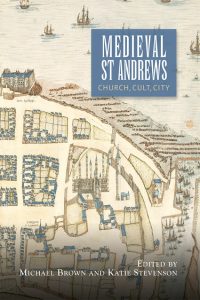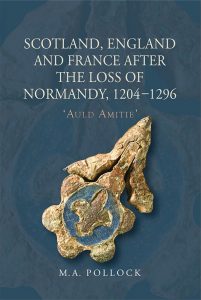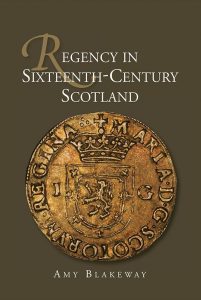St Andrews Studies in Scottish History (SASSH)
The ISHR publishes a prestigious book series in association with Boydell & Brewer.
St Andrews Studies in Scottish History (SASSH) provides an important new opportunity to publish high quality research – monographs, conference proceedings, editions of sources – on any aspect of Scottish history from the early middle ages to the present day. All submissions are subject to rigorous peer review.
Proposals from both first time and established authors are welcome.
The editorial board comprises: Roger Mason, Michael Brown, David Allan (ISHR, St Andrews University), Dauvit Broun (Glasgow University), and Catriona MacDonald (Glasgow Caledonian University).
Proposals for publication should be sent in the first instance to Prof. Roger Mason.
Titles can be purchased online from Boydell and Brewer.
Current titles:
Medieval St Andrews: Church, Cult, City
Edited by Michael Brown and Katie Stevenson
St Andrews was of tremendous significance in medieval Scotland. As a centre of earthly and spiritual government, as the place of veneration for Scotland’s patron saint and as an ancient seat of learning, St Andrews was the ecclesiastical capital of Scotland. This volume provides the first full study of this special and multi-faceted centre throughout its golden age.
Contributors: Michael Brown, Ian Campbell, David Ditchburn, Elizabeth Ewan, Richard Fawcett, Derek Hall, Matthew Hammond, Julian Luxford, Roger Mason, Norman Reid, Bess Rhodes, Catherine Smith, Katie Stevenson, Simon Taylor, Tom Turpie.
The Life and Works of Robert Baillie (1602-1662) Politics, Religion and Record-Keeping in the British Civil Wars
Alexander D Campbell
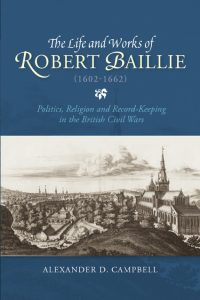 From 1637 to 1660, the Scots witnessed rapid and confused changes in government and violent skirmishing, whilst impassioned religious disputes divided neighbours, friends and family. One of the most vivid accounts of this period may be found in the letters of the Glaswegian minister, Robert Baillie; but whilst his correspondence has long featured in historical accounts of the period, the man behind these writings has largely been forgotten. Based on the first, systematic reading of Baillie’s extensive surviving manuscripts, comprising thousands of leaves of correspondence, treatises, sermons, and notebooks, this biography draws together for the first time an analysis of Baillie’s career and writings, establishing his significance as a polemicist, minister, theologian, and contemporary historian.
From 1637 to 1660, the Scots witnessed rapid and confused changes in government and violent skirmishing, whilst impassioned religious disputes divided neighbours, friends and family. One of the most vivid accounts of this period may be found in the letters of the Glaswegian minister, Robert Baillie; but whilst his correspondence has long featured in historical accounts of the period, the man behind these writings has largely been forgotten. Based on the first, systematic reading of Baillie’s extensive surviving manuscripts, comprising thousands of leaves of correspondence, treatises, sermons, and notebooks, this biography draws together for the first time an analysis of Baillie’s career and writings, establishing his significance as a polemicist, minister, theologian, and contemporary historian.
Alexander D. Campbell is Social Sciences and Humanities Research Council of Canada Post-Doctoral Fellow, Queen’s University, Canada.
Children and Youth in Premodern Scotland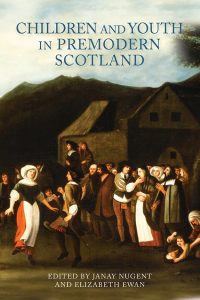
Edited by Janay Nugent and Elizabeth Ewen
Children and youth have tended to be under-reported in the historical scholarship. This collection of essays recasts the historical narrative by populating premodern Scottish communities from the thirteenth to the late eighteenth centuries with their lively experiences and voices. By examining medieval and early modern Scottish communities through the lens of age, the collection counters traditional assumptions that young people are peripheral to our understanding of the political, economic, and social contexts of the premodern era.
Scotland, England and France after the Loss of Normandy, 1204-1296 `Auld Amitie’
MA Pollock
Following King John’s loss of Normandy to King Philip Augustus in 1204, the familial ties that bound the Anglo-French nobility across the Channel spreading into Scotland gradually dissipated. Scotland’s pivotal relationship with England and France transformed as Scottish families began to redefine their identity within a native Scottish and English context apart from their French roots
This book argues that the loss of Normandy ushered in a deep and profound shift in the political and cultural mentality of the Anglo-Scottish nobility.
Regency in Sixteenth-Century Scotland
Amy Blakeway
Three monarchs of Scotland (James V, Mary Queen of Scots, and James VI/I) were crowned during the sixteenth century; each came to the throne before their second birthday. Throughout all three royal minorities, the Scots remained remarkably consistent in their governmental preferences: that an individual should “bear the person” of the infant monarch, with all the power and risks that entailed. In examining the careers of the six men and two women who became regent in context with each other and contemporary expectations, Regency in Sixteenth-Century Scotland offers the first study of regency as a political office. It provides a major reassessment of both the office of regency itself and of individual regents.
Elite Women and Polite Society in Eighteenth-Century Scotland
Katharine Glover
Fashionable “polite” society of this period emphasised mixed-gender sociability and encouraged the visible participation of elite women in a series of urban, often public settings. Using a variety of sources (both men’s and women’s correspondence, accounts, bills, memoirs and other family papers), this book investigates the ways in which polite social practices and expectations influenced the experience of elite femininity in Scotland in the eighteenth century. It explores women’s education and upbringing; their reading practices; the meanings of the social spaces and activities in which they engaged and how this fed over into the realm of politics; and the fashion for tourism at home and abroad. It also asks how elite women used polite social spaces and practices to extend their mental horizons and to form a sense of belonging to a public at a time when Scotland was among the most intellectually vibrant societies in Europe.
